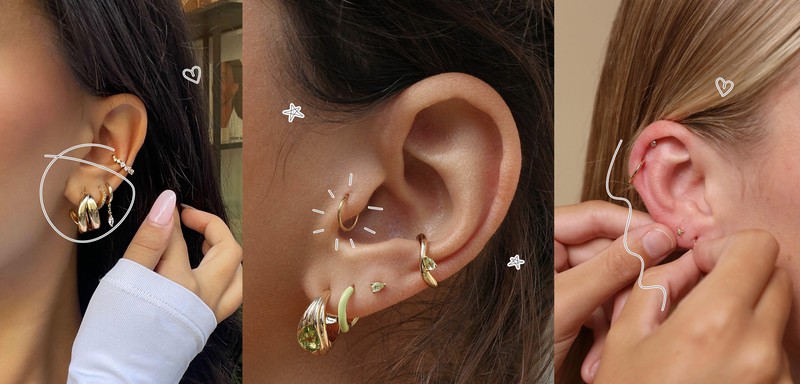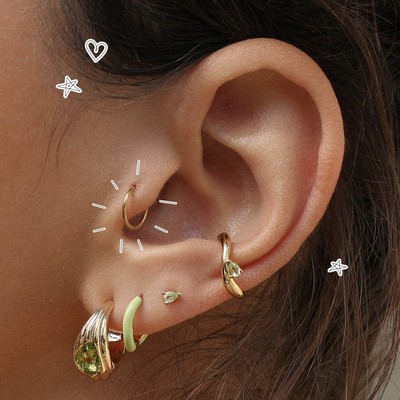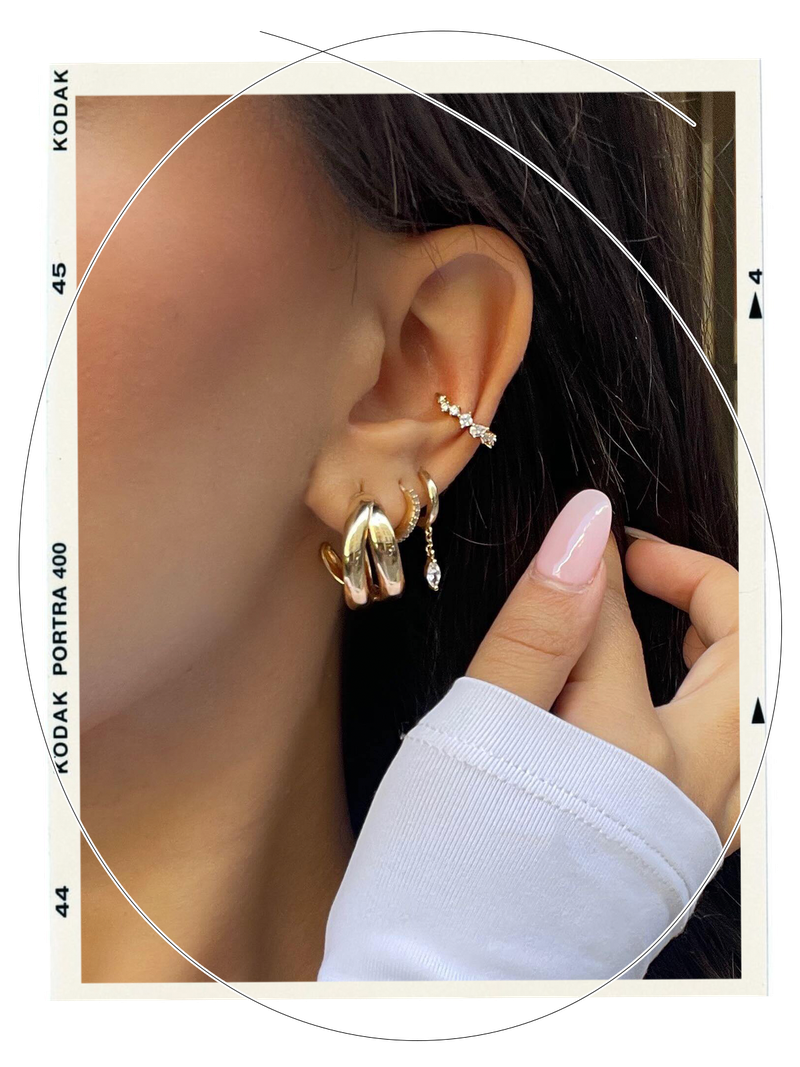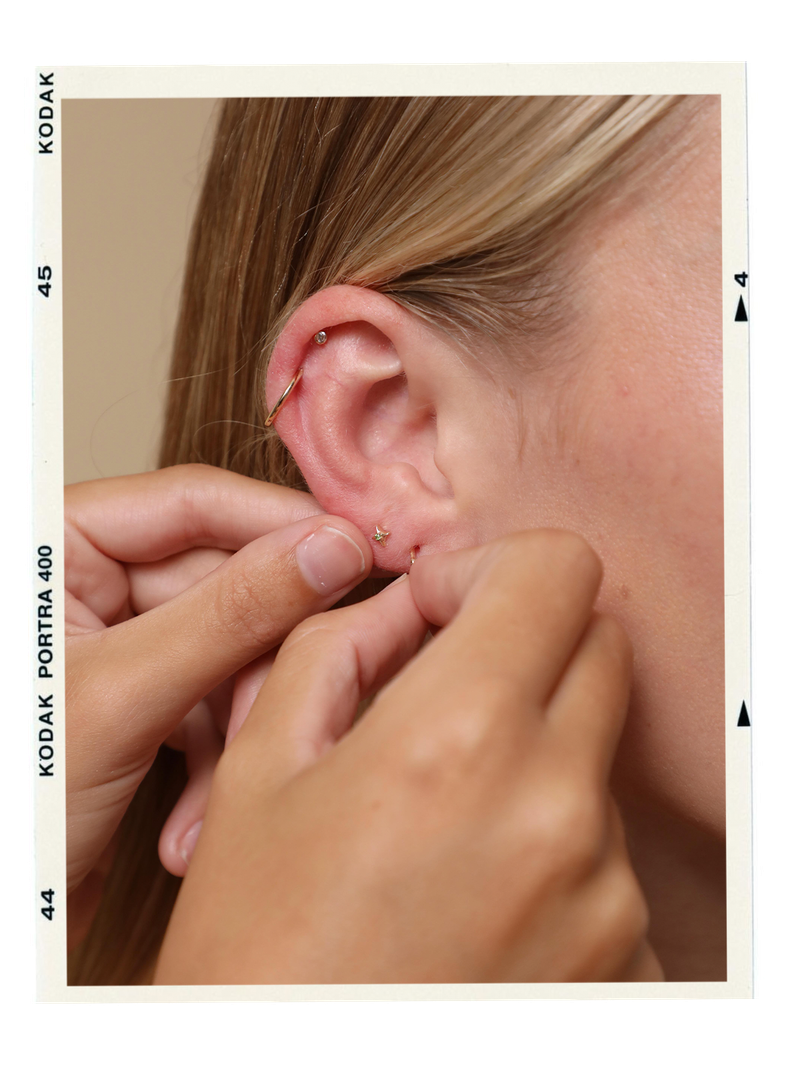

A Guide To Caring For Pierced Ears
PRE-PIERCING
Is there anything to avoid in the 24 hours prior?
“Get a good night’s sleep and don’t drink in the 24 hours before. Also make sure you’ve eaten a couple of hours before – some people also swear by a sugary snack or drink afterwards.” – Laura Bond, founder of Laura Bond Jewellery
Who can’t get a piercing?
“We can’t pierce anyone who has taken blood thinning medication (e.g. aspirin) in the 24 hours beforehand, taken any recreational drugs or alcohol in the 24 hours beforehand, or is pregnant or breastfeeding. We also recommend eating in the four hours before getting your ears pierced to avoid feeling ill or faint” – Charlotte Collins, professional body piercer at Astrid & Miyu
Which metals work best for a piercing?
“Hypoallergenic materials like 14ct solid gold or implant grade titanium are the best options for a fresh piercing as they contain no nickel. Contrary to popular belief, sterling silver is not ideal for fresh piercings as it oxidises over time and can cause the jewellery to tarnish, sometimes staining the skin.” – Charlotte
When’s the best time to get it done?
“The period after piercing is crucial, so think about if you’ve got anything booked in that could put your healing at risk. For example, you’ll need to avoid swimming in lakes, pools or hot tubs for two to three weeks while the piercing is still fresh – so it’s best not to get one done just before a holiday. If you do get your new piercing wet, give it a clean and dry it afterwards – I always use the cool setting on a hairdryer to dry my fresh piercings.” – Laura
Which types of piercings hurt most?
“In my experience anything on the inner ear cartilage like the daith, rook, conch or tragus piercing tend to be more sore – but it’s momentary pain and over very quickly!” – Laura
“Everyone's pain threshold is different, but generally lobe piercings are a good place to start as they’re not too painful and have a quicker healing time than other parts of the ear containing cartilage. Everyone heals differently, but lobes typically take two to three months to heal, with everything else on the ear taking around six to 12 months.” – Charlotte
Are there any types you’d avoid for your first piercing?
“If it’s your first cartilage piercing, I always advise going for something like a flat or low helix – it makes an impact but it’s tucked away on your ear so you’re less likely to bash and knock it, which can cause irritation. Having said that, we have customers who go straight for a daith piercing because they’ve fallen in love with the jewellery. There are no rules – it just depends on how brave you’re feeling!” – Laura
DURING YOUR APPOINTMENT
What should you expect during the appointment?
“A good piercer should make you feel relaxed. They should talk you through the process, mark up where your piercing is going to be, and show you the jewellery you’ve chosen before they begin. They should be happy to answer any of your questions. We advise anyone getting a piercing to practise some deep belly breathing as it promotes calmness.” – Laura
Anything to avoid during a piercing?
“Try not to tense up if at all possible. The more relaxed you are, the smoother the whole experience will be. Make sure you’re sitting or lying comfortably. If you feel at all faint or uncomfortable, let your piercer know.” – Laura
Any advice for those who are nervous?
“It’s over way more quickly than anyone realises – and usually not as painful either. I’d compare it to the pain of getting a wax done, but it’s over much faster.” – Laura
“Don’t hold your breath! Focusing on your breathing is an absolute game changer. By the time you’ve taken a few deep breaths, the piercing is usually done.” – Charlotte
AFTERCARE TIPS
How long do piercings take to heal?
“The healing time will vary depending on your age, health status, general diet, lifestyle and care of the piercing. If your immune system is compromised or your diet is poor, the healing process may be a little prolonged.” – Charlotte
How should you clean the piercing?
“You can start your aftercare regime straight away. It’s important to keep the piercing clean. Use a sterile saline solution to clean the area twice a day, but avoid touching or knocking the piercing. Really the best advice is to leave it alone as much as possible and let the natural healing process occur. I always clean my new piercings twice a day for the first month to two months, then just as needed, depending on the healing process.” – Laura
Any tips for sleeping?
“For the first night, make sure you don’t sleep on it – and make sure you have clean pillowcases. If you must sleep on it, invest in a travel pillow so as not to irritate the piercing and cause it to heel at an angle.” – Laura
What are the best products to use?
“I love NeilMed Piercing Mist. It’s a natural, vegan and preservative-free sterile saline for piercing aftercare. It’s super easy to use – you just point and spray at your new piercing.” – Laura
What should be avoided post-piercing?
“Avoid touching it and be careful not to knock it. Don’t use strong cleaning solutions like alcohol or tea tree oil. You can shower as normal, but make sure you dry the area after. And the biggest one: don’t change your jewellery too early! I see lots of customers who’ve changed their jewellery way too soon because they want to wear something dainty and pretty straight away, but ultimately this just leads to a longer healing process.” – Laura
“Any piercing has the potential to be problematic if you’re not closely following aftercare advice. A good way to ensure your piercings heal smoothly is to avoid using make-up or other products in the area, and to be cautious of wearing in-ear headphones too soon.” – Charlotte
How much bleeding is expected?
“Everyone is different. In rare cases, some people bleed for up to 30 mins after the piercing, and some people don’t bleed at all. Make sure you always disclose any medication you are taking to your piercer as this can affect how much you bleed.” – Laura
HOW TO TREAT INFECTIONS
Why do infections occur?
“It can be a combination of bad aftercare or poor-quality and poor-fitting jewellery. Most people don’t take great care of their piercings until there is a problem, then they care a lot. My advice is to be proactive from the start. Keep it clean and be careful with it. No sleeping on it, no touching it – and if you must, wash your hands first. Gently clean it twice a day with a saline solution. Piercing bumps occur due to irritation. The body doesn’t like the foreign object and fights it, but with some good aftercare you can gently convince your body to heal around it.” – Laura
“Infections occur when bacteria is introduced to the piercing site. The best way to avoid an infection is to make sure you’re not touching your piercing and you’re keeping the area clean, as well as regularly changing any bedding and pillow cases – especially if you have pets.” – Charlotte
How should signs of infection be treated?
“Most piercing ‘infections’ are actually just irritations. Slight swelling and redness plus pale fluid oozing and crusting is completely normal in the first couple of months. It can be managed by cleaning with saline solution or some antibacterial soap. It’s also okay to use a cotton bud to gently wipe any crusties away.” – Laura
Any tips for reducing inflammation?
“When my piercings have flared up in the past, I’ve always used a sterile hot compress. I use boiling water cooled slightly, and apply the compress to the piercing to help with inflammation. Over-the-counter painkillers and anti-inflammatory meds like ibuprofen can help relieve any mild discomfort.” – Laura
When should you see a doctor?
“While some tenderness is normal and to be expected after getting a piercing, if your piercing feels more sore than usual, it’s best to pop in and see your piercer who can assess the situation and recommend appropriate care.” – Charlotte
“If your ear is throbbing, very hot and swollen, and oozing yellow or green fluid, then get it checked out by a medical professional. If it’s infected, you may need antibiotics. Don’t remove the jewellery until you’ve seen a medical professional.” – Laura
THE BEST PLACES TO GO FOR PIERCINGS
For more visit LauraBond.co.uk and AstridAndMiyu.com
DISCLAIMER: We endeavour to always credit the correct original source of every image we use. If you think a credit may be incorrect, please contact us at info@sheerluxe.com.

/https%3A%2F%2Fsw18.sheerluxe.com%2Fsites%2Fsheerluxe%2Ffiles%2Farticles%2F2023%2F05%2F2new-astrid-and-miyu.png?itok=Tyq6SmBl)


